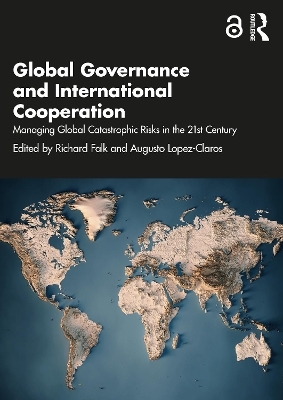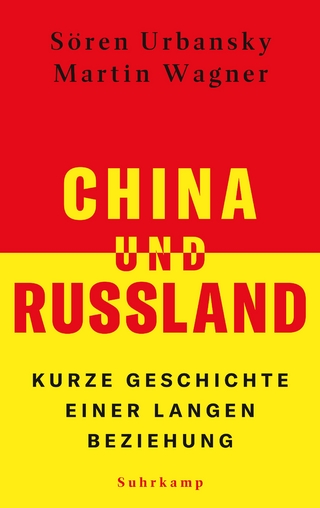
Global Governance and International Cooperation
Routledge India (Verlag)
978-1-032-51019-4 (ISBN)
The Global Governance Forum and the Global Challenges Foundation collaborate in this collection in their concern that the UN Charter and the contemporary infrastructure for international cooperation are no longer fit for purpose and lack the instruments, resources and legitimacy to address the catastrophic risks threatening our future.
Twenty-eight contributors offer thoughtful proposals for reforming existing international institutions and creating new ones to build a more peaceful, prosperous and just world, covering themes such as the management of weapons of mass destruction, collective security arrangements, justice and equity in economics, human rights, migration and refugees, climate mitigation, and food security, all bearing on the health of both people and planet.
The vital project of this century is building institutions that will underpin global governance in coming decades, requiring imagination, persistence, empathy, and confidence that we will find a path to enhanced mechanisms of binding international law and the resources to make that happen. The volume is essential reading for scholars and researchers on international politics and public policy and indispensable for diplomats and government agencies.
Richard Falk is Princeton University’s Albert G. Milbank Professor Emeritus of International Law, Chair of Global Law in the Faculty of Law, Queen Mary University London, Co-director of its Centre of Climate Crime and Climate Justice. He is Research Associate at Orfalea Center of Global Studies at the University of California, Santa Barbara, and Fellow of the Tellus Institute, author of This Endangered Planet (1971) and a memoir, Public Intellectual: The Life of a Citizen Pilgrim (2021). He was nominated for the Nobel Peace Prize in 2023. Augusto Lopez-Claros is an international economist and Executive Director of the Global Governance Forum, with 30 years of experience in international organisations. He was Director of World Bank’s Global Indicators Group, within the Bank’s Development Economics Vice-Presidency. In 2018–19, he was Senior Fellow at the Edmund Walsh School of Foreign Service (Georgetown University) and previously Chief Economist and Director of the Global Competitiveness Program of the World Economic Forum and Resident Representative for the International Monetary Fund in Russia in the early 1990s.
Introduction: Managing Global Catastrophic Risks in the 21st Century: A Global Governance Perspective Part I: Governance for Nuclear, Biological and Chemical Weapons of Mass Destruction 1. Nuclear One-Worldisms, Planetary Vulnerability and Whole Earth Security 2. Psychological and Societal Sources of Nuclear Peace 3. Lessons from Existing WMD Multilateral Programmes and Platforms 4. Toward a Global Nuclear Ban Treaty: ICAN’s Anti-Nuclear Triad 5. Weapons, War and Military Spending: Disarmament Is Fundamental for Human Security and Sustainable Development 6. The International Implications of Japan's Non-Nuclear Policy 7. Rethinking the Geopolitics of a Collective System for Armament Regulation Part II: Governance for Peace and Security: International Disputes, Peacemaking and Peace Enforcement 8. Enhancing Global Governance 9. Revitalizing UN Collective Security: A Modest Proposal 10. Global Governance and Human Security 11. Three Aspects of Radical Inclusion Necessary for a Workable New System for the Peaceful Settlement of International Disputes 12. Infrastructures for Peace: A New Layer of Peace and Security Governance? 13. ‘Organic Evolution’ in the United Nations: Retrospect and Prospect 14. Toward Global Parliament: An Affirming Reassessment After 22 Years 15. Global Governance for Civilisational Crises 16. The International Court of Justice and Its Role in the Peaceful Settlement of Disputes in the 21st Century: From Quick Wins to Tectonic Shifts 17. Prospects for Operationalizing UN Charter Article 26 18. Finessing R2P, an International Peace Force to Protect Heritage and Humans Part III: Governance for Climate and People: Climate Change, Planetary Boundaries, Economics, Health, and Population 19. Towards Effective Multilevel Environmental and Sustainability Governance for Shared Ecological Risks 20. Global Food Systems in Crisis: A Human Rights Approach 21. Transformative Shifts for a New Global Environmental Governance 22. The International Criminal Court: Origins, Challenges, and Desirable Reforms to Strengthen It 23. State Interests and the Global Response to Forced Displacement: How Can We Move Forward? 24. Carbon, Confusion and Conflict: Global Governance Implications of the Net-Zero Energy Transition 25. Combatting Corruption to Advance Good Governance: Exploring Options for an International Anticorruption Court 26. Global Health Governance: Lessons from the Pandemic 27. What Do Extreme Poverty and Inequality Mean for Global Political Stability?
| Erscheinungsdatum | 09.03.2024 |
|---|---|
| Zusatzinfo | 1 Tables, black and white; 2 Line drawings, black and white; 5 Halftones, black and white; 7 Illustrations, black and white |
| Verlagsort | London |
| Sprache | englisch |
| Maße | 174 x 246 mm |
| Gewicht | 1130 g |
| Themenwelt | Sozialwissenschaften ► Politik / Verwaltung ► Europäische / Internationale Politik |
| Wirtschaft ► Volkswirtschaftslehre ► Wirtschaftspolitik | |
| ISBN-10 | 1-032-51019-6 / 1032510196 |
| ISBN-13 | 978-1-032-51019-4 / 9781032510194 |
| Zustand | Neuware |
| Informationen gemäß Produktsicherheitsverordnung (GPSR) | |
| Haben Sie eine Frage zum Produkt? |
aus dem Bereich


